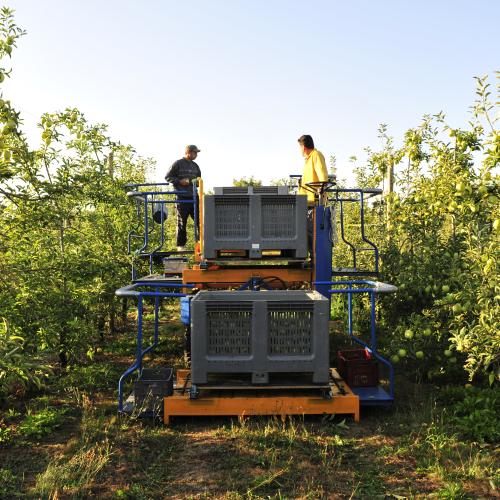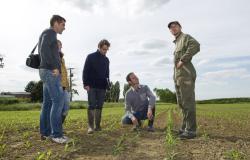The agroecological transition and food system transformations
Systemic transformations along the continuum from production to consumption that integrate economic and social drivers.

An in-depth redesign of agricultural and food production systems is required to meet food demand, with safe, healthy and sustainable food, by reducing negative environmental and health impacts of production, increasing food system resilience to global changes, improving the autonomy of territories and answering socioeconomic challenges. To this end, more holistic research is needed bringing together sustainable production and responsible consumption principles
- An exploration of transitions and obstacles to autonomy
- Agricultural systems free from synthetic pesticides
- Farming transitions
- Creation of high-quality diets
- Healthy, sustainable, accessible, and satisfying food for all
Focus

LIMA (Less Inputs and More Agroecology) is a European programme under construction in the framework of the Green Deal Call and in response to the European Union's Farm to Fork strategy. It brings together 58 partners, including 29 from the private sector, from 16 European countries. It mobilizes research to reduce the use of pesticides and fertilizers and to minimize nutrient losses in all major sectors: field crops, grasslands, vineyards and arboriculture. Its approaches range from the plot to the territory scale, include support for farmers, and are based on work with companies and adaptation scenarios to influence public policies.
Drawing upon the experiences of the French farm network DEPHY, the H2020 IPMWORKS project will build a European farm network with a two-fold objective: to demonstrate integrated pest management (IPM) strategies, which use small quantities of pesticides, and to promote the adoption of such strategies via knowledge exchange and peer-to-peer learning among farmers.
Highlights: Scaling up organic agriculture | Farm animal Health and Welfare | CAP
Accelerating agroecological and food transitions while answering socioeconomic challenges
An exploration of transitions and obstacles to autonomy
To address impediments to autonomy and resilience, INRAE is carrying out long-term integrated analyses of how supply and demand respond to the risks and disturbances associated with current transitions. These analyses are exploring interactions at many scales (e.g., farms, regions, individual European countries, Europe as a whole, and other major regions of the world). We want to clarify the factors driving and preventing various stakeholders from adopting new forms of production and consumption. Furthermore, we are investigating economic and social determinants as well as the processes, tools, and public policies that shape the directions taken by agricultural and food production systems.
Agricultural systems free from synthetic pesticides
We must rebuild cropping systems from the ground up if we wish to dramatically reduce pesticide use while simultaneously maintaining the livelihoods of farmers and product affordability for consumers. The French government has tasked INRAE with running a priority research programme, Growing and Protecting Crops Differently, which combines the efforts of numerous research teams across several scientific establishments. The European Research Alliance towards a Chemical Pesticide-Free Agriculture 19, has brought together several European countries and research institutions. It will be sending along proposals to the European Commission as part of the European Green Deal. Our research focuses on tools at a diversity of scales, from farms to regions, and examines the continuum from production to processing to distribution. We are also looking at the factors determining production levels, economic performance, and environmental effects.
Farming transitions
Both intensive and extensive farming systems have negative environmental impacts. They also raise ethical issues related to animal welfare and concerns over the working conditions and income of livestock farmers. Our research seeks to build livestock systems that support animal health, animal welfare, and farmers’ quality of life while also generating high-quality, healthy food products. Given current transitions in food consumption and diets, we also recognise the importance of capitalising on the nutritional, environmental, and societal services provided by livestock farms, while reducing their negative impacts and ensuring their economic viability.We are performing interdisciplinary work on these topics via the metaprogramme Farm Animal Health and Welfare (SANBA), and we run a regional innovation laboratory (LIT Ouest Territoires d’Elevage), which brings together all types of stakeholders, including farmers, consumers, and everyday citizens..
Creation of high-quality diets
We need to rethink the relationships among agricultural production and food processing, distribution, and consumption. As dietary shifts boost agroecological farming practices, we will need to change how we gather, store, process, formulate, and preserve food. It will also be necessary to update current marketing methods. For example, to increase protein and nitrogen autonomy, we need tools that will allow us to better exploit nitrogen fixation by symbionts as we develop protein-rich plants for human consumption. INRAE research is revisiting how the characteristics of food are constructed by working on processing and production methods in tandem, from farm to fork and fork to farm, and by integrating issues related to system competitiveness and both the expectations of consumers and the general public.
Healthy, sustainable, accessible, and satisfying food for all
The prices of agricultural supplies and food products are coming under increased pressure due to population growth, environmental regulations, international exchanges, global trade, and disruptions in supply chains due to climate change and health crises. We are facing major threats to food autonomy and security. INRAE research focuses on innovation pathways; organizational structures; system location, diversity, and coexistence; food price dynamics; market operations; and the distribution of value within industries. We analyse and evaluate policies related to agriculture and food production as well as the interactions of such policies with trade policies, environmental policies, and corporate strategies. The goal is to forecast the consequences, synergies, and stresses arising from interactions among public policy objectives, stakeholder priorities, and decision-making hierarchies.
More information
Research themes: Agroecology & Society and regional strategies
Our metaprogrammes: SANBA, Animal Health and Welfare ; METABIO, Scaling up organic agriculture ; SuMCrop, Sustainable management of crop health
